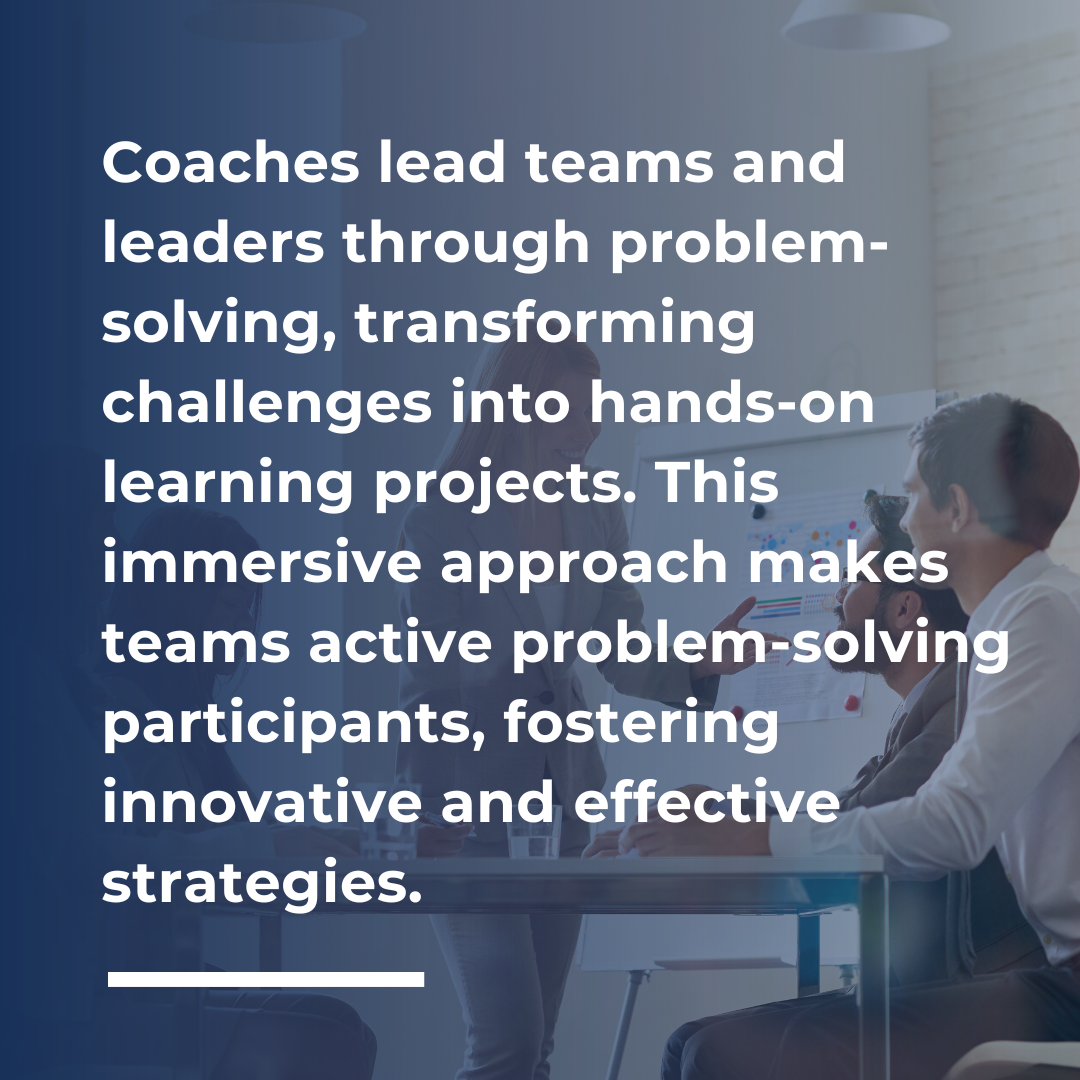In the dynamic and often challenging landscape of the nonprofit sector, coaching has emerged as a crucial and transformative tool for organizations aiming to maximize their impact and sustain their mission-driven work. Non-profits, motivated by a passion for social and humanitarian objectives, operate under unique constraints related to resources and operational capacity. It is within this context that coaching plays a vital role in bolstering staff retention — a key to maintaining the heart of these organizations.
Coaching introduces a strategic advantage, serving as more than just a means for professional development. It nurtures personal growth, fosters a stronger sense of community, and instills a deeper connection to the organization’s purpose. This approach not only empowers individuals but also strengthens staff loyalty, which is essential for sustaining the organization’s long-term effectiveness and success.
What is Coaching?
Collaborative in nature, coaching is a partnership between two individuals aimed at fostering growth, both personal and professional. Coaching is a thought-provoking, creative process that nudges people to introspect, challenge their preconceived notions, and step out of their comfort zones. It’s not about providing answers but about asking the right questions and guiding individuals to discover insights and solutions that resonate with their unique experiences.
The Growing Importance of Coaching
Leaders today are faced with challenges that are as multifaceted as they are unprecedented. It’s in navigating these complex terrains that the significance of coaching becomes glaringly evident. Gary Bagley, an executive coach and former CEO of NY Cares, notes the importance of coaching for CEOs, but also the effect it has on the entire organization. “The demands of the non-profit CEO role have skyrocketed, paralleled by the push to establish strong leadership and succession planning. More executives and boards now see that improving performance, alongside an experienced coach, is pivotal for their organization’s success.”
The demands of the non-profit CEO role have skyrocketed, paralleled by the push to establish strong leadership and succession planning. More executives and boards now see that improving performance, alongside an experienced coach, is pivotal for their organization’s success.
A survey by the Human Capital Institute highlighted that over 80% of organizations have incorporated some form of coaching, whether it be external, internal, or managerial/leadership coaches. Coaching is a catalyst — a force that propels leaders to confront, address, and surmount challenges, both anticipated and unforeseen. A leader spends the majority of their time strategizing, collaborating, and making decisions. With a coach, they can create space in their day to dive into reflection, analyze actions, draw conclusions, and plan next steps. This blend of action and reflection amplifies a leader’s efficacy and ensures they’re not just participants but pioneers in their fields.
The ripple effects of coaching are profound, reaching beyond just the individual. Enhanced leadership reshapes teams, reshuffles strategies, and reframes visions. Coaching isn’t just about personal growth — it’s a change agent for organizational evolution.
Why Engage Coaches for Your Organization?
A study by the Manchester Consulting Group highlighted that companies that invested in coaching witnessed an average return on investment (ROI) of almost six times the cost of the coaching. Organizations that have embraced a coaching culture report higher employee engagement, improved team dynamics, and enhanced performance metrics. The right coaching interventions can enhance communication, foster a culture of continuous learning, and drive initiatives with a unified vision. A coach’s role is multifaceted:
They unlock untapped sources of imagination, fueling innovation and creative problem-solving.
They enhance productivity, not by introducing more tools, but by streamlining thought processes.
They empower individuals to take charge of their journey, fostering leadership skills.
The non-profit sector, defined by its mission-driven focus and unique challenges, necessitates a specialized approach to leadership and development. Although coaching’s core principles are universal, their implementation within the non-profit realm is customized to address its particular intricacies. Let’s explore how various coaching methodologies impact the non-profit sector.
Leadership Coaching Methodology
Non-profit leaders face unique challenges like resource limits and evolving social impact landscapes. Leadership coaching in non-profits equips leaders with tools for better decision-making, stakeholder relations, and navigating social change. Leaders are coached to inspire and lead effectively, blending passion with practicality to realize both dreams and tangible results.
As noted by Mark Roithmayr, CEO of Alzheimer’s Drug Discovery Foundation, “In this day and age, I can’t imagine any CEO in non-profit not utilizing an outside coach for perspective, acumen, and a true voice. It’s key to pick a coach that fits you, your style, and the specific moment in time you are confronted with.”

Team-Based Coaching Methodology
Non-profits thrive on teamwork and shared goals. This type of coaching emphasizes a team-based approach, shifting from individual achievements to collective impact. Coaches help teams align goals, improve dynamics, and cultivate a collaborative culture. This transforms groups into unified, mission-driven teams, leading to resilient, adaptable organizations poised for lasting impact.
At the heart of coaching lies the individual. A coach, with their expertise, insights, and tools, partners with this individual to embark on a journey of exploration, reflection, and growth. This partnership has the power to catalyze profound individual transformations, which have a significant ripple effect on organizations. Teams collaborate more effectively, leaders inspire more authentically, and challenges are navigated with agility and innovation. In fact, a study by Webinarcare found that companies that offer coaching witnessed a 61% improvement in productivity and a 48% improvement in team functioning.

Problem-Based Coaching Methodology
Non-profits often face complex challenges, from funding issues to regulatory changes. Problem-based coaching sees these not as obstacles but as chances for growth and innovation. Coaches lead teams and leaders through problem-solving, transforming challenges into hands-on learning projects. This immersive approach makes teams active problem-solving participants, fostering innovative and effective strategies.

Coaching is crucial for organizations, when organizations have the right people on their team receiving the right support and development through coaching, they can unlock the full potential of their people and thrive in today’s competitive business landscape.
Is it Time to Bring Coaching to Your Organization?
According to ICF, the median ROI for companies investing in coaching was 700%. These numbers reflect the cascading benefits of coaching in an organization – from enhanced leadership capabilities and improved team dynamics, to innovation, agility, and resilience. When organizations invest in coaching, they’re investing in a future of growth, success, and excellence.
In a world driven by metrics, the case for coaching stands robust, grounded in data, and validated by success stories across the spectrum. “Coaching is crucial for organizations,” says Zach Smith, Co-Founder + Chief Activation Officer at Activate 180. “When organizations have the right people on their team receiving the right support and development through coaching, they can unlock the full potential of their people and thrive in today’s competitive business landscape.”
This isn’t just a testament to the power of coaching but a clarion call for its adoption. At this point of change, growth, and evolution, one question remains: Is it time to bring coaching to your organization?
If coaching seems like the next step in evolving your organization’s capabilities, don’t hesitate to reach out. I’m here to guide you through the possibilities and connect you with resources that can facilitate this vital transition.

Partner
swaterbury@mbexec.com
o: 347.923.7087
m: 917.680.6778
Sue Waterbury serves as a Partner at McDermott + Bull and is part of the firm’s Education, Non-Profit, + Public Entities Practice, based in New York City, NY. Committed to value, transparency, and diversity, her collaborative approach ensures a thorough and successful search process.
With more than 15 years in executive search, Sue specializes in recruiting transformative leaders for diverse organizations ranging from global enterprises to startup nonprofits. Her expertise spans human services, medical research, advocacy, environmental, education, and healthcare sectors with notable clients like Girl Scouts of Greater New York, Alzheimer’s Drug Discovery Foundation, and Make-A-Wish Metro.

